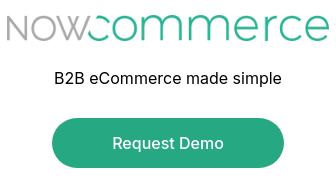eCommerce solutions built for B2C businesses are usually not appropriate for B2B businesses.
It’s very common for up-and-coming manufacturers, distributors, wholesalers, and importers to think that their site needs to be like Amazon. That’s simply not the best way to do business with B2B customers. It’s not how your customers want to do business; quite frankly, it’s not how you want to do it. It’s worthwhile to emulate certain aspects of the Amazon experience, but not necessarily all of them.
 Here’s the difference: Amazon has a shopping cart (most modern eCommerce systems are shopping-cart-based). B2B eCommerce, though? A shopping cart with the same available products, inventory, and pricing with credit card checkout for every customer doesn’t reflect the reality of how your customers purchase and order products.
Here’s the difference: Amazon has a shopping cart (most modern eCommerce systems are shopping-cart-based). B2B eCommerce, though? A shopping cart with the same available products, inventory, and pricing with credit card checkout for every customer doesn’t reflect the reality of how your customers purchase and order products.
If you want a B2B eCommerce system that integrates with QuickBooks, you must ensure that the solution provides the best possible experience for your customers.
And that means customer and sales rep portals.
The Best B2B eCommerce QuickBooks Integrations Provide Dedicated Customer and Sales Rep Portals
Most B2B manufacturers, distributors, wholesalers, and importers use QuickBooks. That’s not something that will change any time soon, which is why you’re searching for a QuickBooks eCommerce integration in the first place.
If you want to provide eCommerce for your customers and you’re “locked in,” so to speak, to QuickBooks, the best solution is going to be tailor-made both for the nature of B2B customers (and their purchasing habits) and for the unique needs of QuickBooks.
B2B customers don’t browse a website for hours comparing products. They don’t put items in their shopping cart and let them sit there for weeks on end, trying to discern if those products are exactly what they’re looking for.
B2B customers have a pretty solid idea of what they’re looking for long before they ever reach you. Even when they’re brand new customers and are unfamiliar with you, your products, or your business (like a new restaurant that has never worked with a supplier before), you or your sales rep can quickly help them determine their needs.
After that, it simply becomes a matter of placing repeat orders. Of course, every industry is different, and there will be changes to what your customers order throughout the year, but even with seasonal changes or changes resulting from changes to their business, the ordering process itself will look very similar from month to month.
These customers need a few things out of the eCommerce solution you provide:
- They need accurate information about product availability and inventory levels
- They don’t need to view or access your entire product catalog
- They need only to see pricing (and availability, for that matter) that has been specifically determined beforehand by you
And on your end, you need all their orders to be sent automatically to QuickBooks.
The value of having these portals is clear, both on the customer’s side and on your side (and your rep’s side too).
From the customer’s point of view, there isn’t much extraneous information that gets in the way of the ordering process. If they’re making a repeat order, they can easily submit it and be done with it—they can even train an employee to make orders so they can focus on other work.
From your point of view, life is easier too. You no longer have to worry that an error has been introduced somewhere between the order being placed and the order hitting QuickBooks, which means you don’t have to worry about a mistake further down the line. You’ll know that your customers aren’t going to order anything strange (or anything that you can’t fulfill) because you’ll have precisely set the products and availability that they can see.
It’s great for your reps, too. They save time in the field because they can easily see current inventory levels from their portals and what products are and aren’t available to specific customers.
Everyone wins — at least, that’s how the best eCommerce QuickBooks integrations should be set up, though not all of them are.

